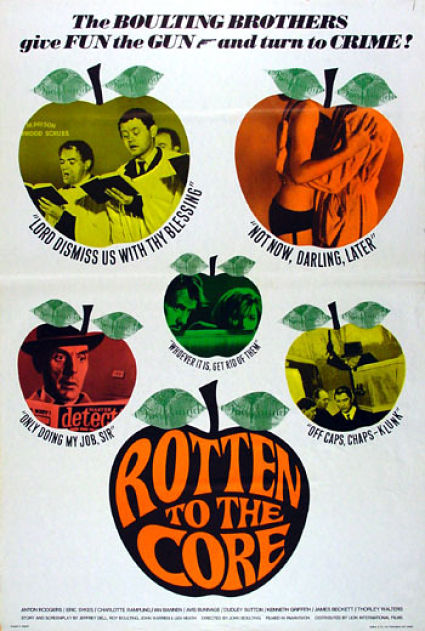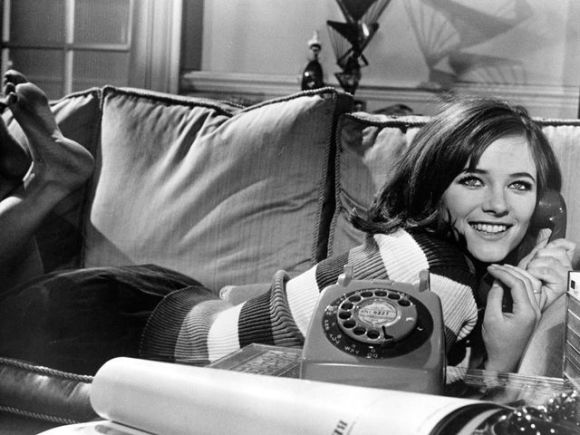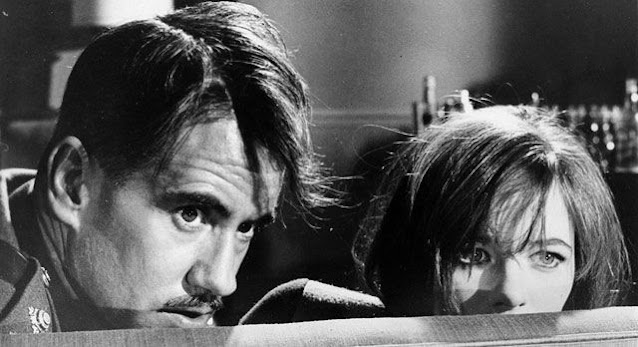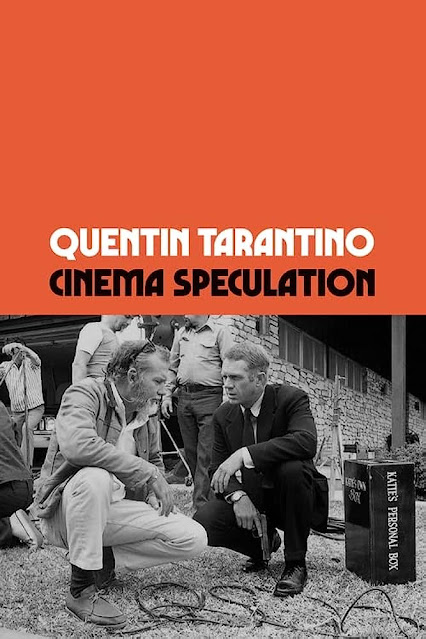Rotten to the Core (1965)
Director John Boulting
Running time 89 mins | Black & white | Widescreen Panavision
This crime comedy begins with three small time criminals - Lenny the Dip (Kenneth Griffith), Scapa Flood (James Beckett) and Jelly Knight (Dudley Sutton) - about to be released from Wormwood Scrubs Prison. Their gang's mastermind is Randolph Berkeley-Greene, nicknamed "The Duke" (Anton Rodgers). But he is still on the outside, having provided himself with a cast iron alibi for their last job.
Eventually the three ex-cons find the Duke alive and well and posing as the head doctor at a health farm, the Hope Springs Nature Clinic. He is planning to steal almost a million pounds of army wages intended for soldiers taking part in a NATO exercise at the military base nearby. His girlfriend Sara has been cultivating a military police officer, Lieutenant Vine (Ian Bannen), who will be guarding the money. All the gang need to steal the loot is a hearse, a fake general and a borrowed army tank.
 |
| Original poster for "Rotten to the Core" |
In the late 1950s, though, they became especially associated with comedy, making a series of sharp satires on British life. Between 1956 and 1963, the Boultings took on various British institutions - the army (in Private's Progress), the law (Brothers in Law), academia (Lucky Jim), the Foreign Office (Carlton-Browne of the F.O.), industry and the trade unions (I'm All Right, Jack) and the Church (Heavens Above!). But the Boultings began to flounder in the mid-1960s and there are clear signs of that in Rotten to the Core.
But a crime comedy seems a little obvious and predictable as subject matter for the Boulting brothers and it lacks the opportunities for satire that their earlier films provided. Crime comedies were also firmly established as a British cinema standby at this time, meaning that Rotten to the Core would struggle to bring anything new to the genre.
 |
| Lenny the Dip (Kenneth Griffith) with The Duke (Anton Rodgers) |
Two of the gang in Rotten to the Core even have the same names as characters from Two Way Stretch - Jelly Knight (played by David Lodge in Two Way Stretch) and Lenny the Dip (Bernard Cribbins in the same film). There's also a character called Anxious O'Toole, who is obviously a relation of gang boss Nervous O'Toole, who was played by Cribbins in The Wrong Arm of the Law. All of this raises the intriguing possibility of a Warren & Heath "shared universe" of crime films, long before Marvel got there with their superheroes.
One early indicator of this is the army base being located at a place called Longhampton - "hampton" being slang for penis (supposedly rhyming slang, from Hampton Wick in London). So a long hampton is a, well you get the idea.
 |
| Charlotte Rampling as the Duke's girlfriend Sara |
There's also an interesting passive-aggressive thing going on about the role of the German general who is being impersonated by the Duke. In the scenes where he is inspecting British troops, there's an implicit "There's a bloody Kraut ordering our soldiers around" undercurrent to the humour. This is used by the Duke to rile Lieutenant Vine and get some laughs by taunting him when he decides to inspect his men while disguised as the German general.
In that sense, Rotten to the Core feels almost like an early Eurosceptic movie, combining the understanding that Britain would increasingly be working with its European allies, including former enemies, with a sense that many people don't like that idea very much.
 |
| British lobby card for Rotten to the Core, with Ian Bannen in the tank turret |
Apart from the uncertainty in the script, the biggest problem that Rotten to the Core suffers from is too many centres of interest and no central character for the audience to focus on. It's not even clear who the main character actually is. Is it the three criminals newly released from prison? Is it the Duke? Is it his girlfriend Sara? This may be a result of too many writers being involved in the script.
 |
| Percy Vine (Ian Bannen) with Sara (Charlotte Rampling) |
Although the film lacks a central character to channel audience interest, the proliferation of characters does have its compensations. Because it means that we get Ian Bannen as a stuff-shirted army officer, Peter Vaughan as Rampling's plain-speaking father, Eric Sykes as a private detective and Thorley Walters as an impossibly vain police chief.
Sykes and Walters are particularly good value. Sykes's private detective character, William Hunt, was invalided out of the Metropolitan Police with (what else?) flat feet. After being given the assignment of keeping watch on Rampling's character, he stakes out her flat in an array of increasingly absurd disguises.
 |
| Detective Hunt (Eric Sykes) gets some tips from a crime magazine |
Rotten to the Core did receive a BAFTA nomination for best black & white British art direction for its veteran designer Alex Vetchinksy. Although this was 1965 and competition in black and white was not very strong by this time, as most films with elaborate sets were now made in colour.
Ultimately, Rotten to the Core is a middling comedy that uncertainly mixes the Boultings' satirical style with a more traditional crime comedy. It does contain a few laughs and there are compensations in some of the supporting performances. But there's no question that it's a step down after the Boultings' satires of the 1950s and early '60s, and a clear sign that they were losing their previously sure touch.
Cast Anton Rodgers (Randolph Berkeley-Greene, "The Duke"), Charlotte Rampling (Sara Capell), Eric Sykes (William Hunt), Ian Bannen (Lieutenant Percy Vine), Thorley Walters (Chief Constable Preston), Peter Vaughan (Sir Henry Capell), Dudley Sutton (Jelly Knight), Kenneth Griffith (Lenny the Dip), James Beckett (Scapa Flood), Victor Maddern (Anxious O'Toole), Avis Bunnage (Countess de Wett), Frank Jarvis (Moby), Arthur Skinner (Nick the Bible), Ian Wilson (Chopper Parsons), Kenneth Dight (Dirty Bertie), Andre Van Gyseghem (Field Marshal von Schneer), Peter Zander (German ADC), Robert Bruce (War Office Major), Neil Hallett (Guard commander), Danvers Walker (British ADC), Basil Dignam (The General), Barbara Everest (Mrs Dick), Margaret Lacey (Miss Rossiter), Cameron Hall (The Admiral)
Uncredited: Raymond Huntley (Prison Governor), John Baker (Strangler Fred), Richard Coleman (Inspector Hewlett), Dandy Nichols (Woman in cemetery), Aimée Delamain (Lady Greville), Edna Morris (Woman on tube), Tony Quinn (Cemetery keeper), Lockwood West (Bank manager), John Trenaman (Prison warder), John Comer (Police Sergeant), John Boulting (Tube traveller)
Producer Roy Boulting Cinematography Freddie Young Art director Alex Vetchinsky Editor Teddy Darvas Music Michael Dress Music played by The New Jazz Voices, conducted by Douglas Gamley Special effects Wally Veevers Associate producer Philip Shipway
Production company Charter Film Productions
Distributor British Lion (UK), Cinema V (US)


Comments
Post a Comment